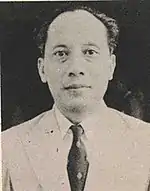Wilopo
Wilopo (21 October 1908 – 1 June 1981) was the seventh Prime Minister of Indonesia. His cabinet is known as the Wilopo Cabinet.
Wilopo | |
|---|---|
 | |
| Minister of Labour | |
| In office 20 December 1949 – 6 September 1950 | |
| Preceded by | Soekiman Wirjosandjojo |
| Succeeded by | Ali Sastroamidjojo |
| Minister of Trade and Industry | |
| 7th Prime Minister of Indonesia | |
| In office 1 April 1952 – 30 July 1953 | |
| Preceded by | Soekiman Wirjosandjojo |
| Succeeded by | Ali Sastroamidjojo |
| 5th Foreign Minister of Indonesia | |
| In office 3 April 1952 – 29 April 1952 | |
| Preceded by | Mohammad Roem |
| Succeeded by | Moekarto Notowidigdo |
| Personal details | |
| Born | 21 August 1908 Purworejo, Central Java, Dutch East Indies |
| Died | 1 June 1981 (aged 72) Jakarta |
| Political party | Indonesian National Party |
Biography
Wilopo was born in Purworejo, Central Java on 21 October 1908.[1] As a child, he studied at Taman Siswa, later becoming a teacher there.[2]
Wilopo's first government position was as the Junior Minister of Labour during the First and Second Amir Sjarifuddin Cabinets from 3 July 1947 to 29 January 1948.[3][4] After a brief hiatus, he became the Minister of Labour during the Republic of the United States of Indonesia Cabinet from 20 December 1949 to 6 September 1950; he was later the Minister of Trade and Industry during the Sukiman Cabinet.[3][4]
After completing his tenure as Minister of Trade and Industry, on 19 March 1952, Wilopo was told to choose a cabinet to lead. Three days after giving his list to President Sukarno, on 1 April he and his cabinet took power;[5] it was essentially a coalition of necessity between the Masyumi and National parties.[6] During his time as prime minister he also spent 26 days as Foreign Minister, from 3 to 29 April, making him the shortest serving Indonesian foreign minister as of 2011.[3] As prime minister, he was initially able to draw support from the army by unhesitatingly accepting Sultan of Yogyakarta Hamengkubuwono IX as defence minister.[7] After fourteen months, the cabinet collapsed; the collapse was blamed on land issues.[8]
From 1955 to 1959, Wilopo served as the Speaker of the Constitutional Assembly of Indonesia.[3] He later became head of the Commission of Four, a part of the Corruption Eradication Team, with his service beginning in June 1970.[3][9] Despite finding "corruption everywhere", no actions were taken by the government.[9]
Wilopo died in Jakarta in 1981.[10]
Views
Herbert Feith, an Australian scholar on Indonesian politics, notes that Wilopo was widely considered fair-minded and sympathetic to the plight of the working classes, working carefully towards his goals.[2] As he did not prioritize party loyalty, he was known as being able to cooperate with anyone.[2]
References
- Footnotes
- Bahari 2011, p. 35.
- Feith 1958, p. 95.
- Bahari 2011, p. 36.
- Presidential Library, Wilopo.
- Feith 1958, p. 86.
- Ricklefs 2001, p. 297.
- Feith 1958, p. 90.
- NY Times 1953, Land Issue Ousts.
- Ricklefs 2001, p. 360.
- Embree 1988, Wilopo (1909–1981).
- Bibliography
- Bahari, Adib (2011). Pendekar Hukum Indonesia [Indonesian Legal Giants] (in Indonesian). Yogyakarta: Pustaka Yustisis. ISBN 978-979-3411-04-0.CS1 maint: ref=harv (link)
- Embree, Ainslie Thomas, ed. (1988). "Wilopo (1909–1981)". Encyclopedia of Asian History. 4. Asia Society. p. 218. ISBN 978-0-684-18901-7.
- Feith, Herbert (1958). The Wilopo Cabinet, 1952–1953: A Turning Point in Post-Revolutionary Indonesia. Ithaca: Cornell University. OCLC 3943883.CS1 maint: ref=harv (link)
- "Land Issue Ousts Indonesia Cabinet; Wilopo, Facing Defeat on His Program by Red-Backed Coalition, Resigns". The New York Times. 3 June 1953. p. 4. Retrieved 11 December 2011.
- Ricklefs, Merle Calvin (2001). A History of Modern Indonesia since c. 1200 (3rd ed.). Stanford: Stanford University Press. ISBN 978-0-8047-4479-9.CS1 maint: ref=harv (link)
- "Wilopo" (in Indonesian). Presidential Library of Indonesia. Retrieved 10 December 2011.
| Political offices | ||
|---|---|---|
| Preceded by Sukiman Wirjosandjojo |
Prime Minister of Indonesia 1952–1953 |
Succeeded by Ali Sastroamidjojo |
| Preceded by Achmad Soebardjo |
Foreign Minister of Indonesia 1952 |
Succeeded by Moekarto Notowidigdo |
